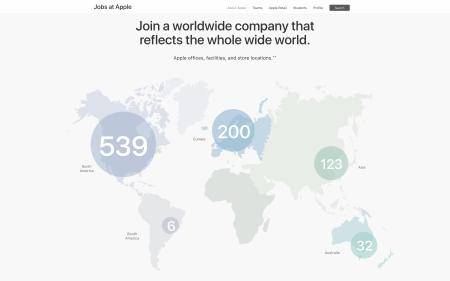Is Apple Finally Ready To Set Up An Actual, Official Presence In Africa Via Nigeria?

When the world’s largest tech company by market cap, Apple, unveiled a new careers website on October 22, 2018, it repeatedly hammered on the message of being “a worldwide company that reflects the whole wide world.”
But there was a rather conspicuous gap in the middle of an infographic that Apple put out as an accompanying illustration of its commitment to diversity and inclusion.

This infographic was a map showing Apple’s offices, facilities, and store locations. It was somewhat ironic that the so-called “worldwide company” chose to portray its diversity with a map that displayed a big hole at the centre — all of Apple’s offices, facilities, and store locations in Africa summed up to a grand total of zero.
But it looks like that may change soon as Apple appears to be hiring for a Country Leader in Nigeria who would be its first employee in the world’s most populous African country and also the largest economy on the continent.
However, that’s not to say that the global tech giant has no employees in Africa. In 2018, Apple was seeking an app store manager in Johannesburg, South Africa.
In April 2015, it was reported that Apple was looking to reinvest in South Africa by establishing a South African office in an effort to grow its presence in the local market.
It was the first time the company had made the move for a direct office in South Africa since 1999 when it was forced to disinvest amid mounting losses, and instead, favour a distributor model as it does in many countries.
It was during this period of a purported South African office opening that Apple reportedly appointed French national, Nicolas Rochas, as Country Manager for South Africa.
But if Apple really did set up proper, functional offices in South Africa as far back as 2015, one would expect the company to make sure that fact is highlighted in the already-mentioned infographic from 2018. Especially as it would better reflect its “worldwide company” posturing and spare them the look of missing a large chunk right in the middle of the map while claiming to stand for: “Nobody out, everybody in.”
Now, since Apple’s infographic showed no African presence, maybe there aren’t really any actual Apple offices in Africa to-date. And maybe the Country Manager in South Africa just exists to mainly manage Apple’s relationships with local mobile operators, specifically around sales of the iPhone, which it has typically sold directly to the network providers in South Africa rather than through a local distributor.
Well, not much is known at the moment but there’s a good indication that Apple may finally be looking to set up a proper presence in Nigeria where its devices are mostly sourced from resellers presently. Apple works with local resellers and repair stores in many countries where it doesn’t have official presences.
As per the job description which was put out on February 20, the Country Leader for Nigeria, who is expected to have at least 10 years’ experience in a leadership role, will be tasked with leading the end-to-end business between Apple and its customers both at a corporate level and in the field.
This individual will shoulder the responsibility of driving agreed forecasted and budgeted sales volumes of identified products and agreed level of Apple branding. The areas of work span new business development, partner and channel management.
Such a person would also build and lead extraordinary local teams and improve Apple’s relationships with key government partners, as well as key national and multinational institutions. Summarily, the Nigerian Country Head faces the task of growing Apple’s business across all the lines including iPhone, Mac, iPad, Apple Watch, Services and Accessories.
All these hints at a possible move by Apple for Nigeria. And maybe it’s about time, but not to say that this was always a pressing necessity.
In truth, the African continent isn’t exactly a key market for Apple’s “expensive, luxury, gadgets.”
As a matter of fact, the overwhelming majority of Apple’s revenue comes from the Americas (which is mainly North America, especially as the company has only six offices, stores, or other facilities in all of South America, as against the 500+ in North America, Europe, and China).
Indeed, the Americas, Europe, and China together accounted for up to 86 percent of Apple’s revenue as of 2018 and the company doesn’t even list Africa as a region it sells in on its earnings reports.
And the fact that Google’s Android has as much as 84 percent of the African mobile OS market in its pockets as of 2019 means that Apple has had to focus elsewhere. Budget android devices seem to be a winner on the African mass market.
But times are changing. And perhaps Apple is finally ready to take the African market seriously, especially at a time when its numbers for Africa and the Middle East are starting to look promising.
Featured Image Courtesy: Unsplash